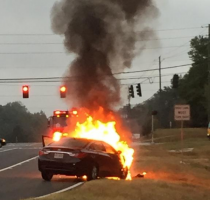
— Hyundai and Kia will pay at least $137 million to the National Highway Traffic Safety Administration (NHTSA) related to recalls of 1.6 million vehicles equipped with Theta II engines.
The Theta II engines can cause fires due to metallic debris remaining from when the engines were manufactured. The debris can enter the engine oil, damage the connecting rods and other engine components and cause engine failures and fires.
Based on the three-year Hyundai consent order, the automaker will make an upfront payment of $54 million and eventually pay an additional $40 million on safety improvements. Hyundai may also be required to pay another $46 million if conditions of the consent order are not satisfied.
The two-year Kia consent order includes an upfront payment of $27 million along with an obligation to spend $16 million on "specified safety performance measures." Kia may also pay $27 million if it violates conditions of the consent order.
The Center for Auto Safety petitioned NHTSA in 2018 to investigate Hyundai and Kia engine fires following hundreds of complaints about the vehicles. Safety regulators granted the petition and launched an investigation which still remains open.
According to the Center, these popular models are the problem:
- 2011-2014 Hyundai Santa Fe
- 2013-2014 Hyundai Santa Fe Sport
- 2011-2014 Hyundai Sonata
- 2011-2014 Hyundai Sonata Hybrid
- 2011-2014 Kia Optima
- 2011-2014 Kia Optima Hybrid
- 2011-2014 Kia Sorento
“Today’s announcement validates the concerns of millions of consumers about a persistent safety hazard and should remind manufacturers there are costs beyond recalls for failing to report dangerous defects, as required by law.” - Jason Levine, executive director of the Center for Auto Safety
The consent orders claim Hyundai and Kia waited too long to issue recalls of more than 1.6 million vehicles as fire complaints continued to pile up. NHTSA also says Hyundai and Kia didn't report accurate information regarding the Theta II recalls.
In addition to the monetary agreements, Kia will create a new safety office in the U.S., and Hyundai will build a facility in the U.S. dedicated to safety investigations.
Hyundai and Kia also agreed to create new programs to detect possible safety problems and each automaker will hire an independent third-party auditor who reports directly to the government.




